Drowned Places Diving
‘An enthralling exploration of the liminal ... breathtakingly good’
TRISTAN GOOLEY
Atlantis in of The
Search

‘The most compelling and evocative of underwater odysseys’ KATE

‘An enthralling exploration of the liminal ... breathtakingly good’
TRISTAN GOOLEY

‘The most compelling and evocative of underwater odysseys’ KATE
Chatto & Windus
london
Chatto & Windus, an imprint of Vintage, is part of the Penguin Random House group of companies
Vintage, Penguin Random House UK, One Embassy Gardens, 8 Viaduct Gardens, London sw11 7bw
penguin.co.uk/vintage global.penguinrandomhouse.com
First published in the UK by Chatto & Windus in 2025
Copyright © Damian Le Bas 2025
Damian Le Bas has asserted his right to be identified as the author of this Work in accordance with the Copyright, Designs and Patents Act 1988
Every effort has been made to contact all copyright holders. The publisher will be pleased to amend in future editions any errors or omissions brought to their attention.
Penguin Random House values and supports copyright. Copyright fuels creativity, encourages diverse voices, promotes freedom of expression and supports a vibrant culture. Thank you for purchasing an authorised edition of this book and for respecting intellectual property laws by not reproducing, scanning or distributing any part of it by any means without permission. You are supporting authors and enabling Penguin Random House to continue to publish books for everyone. No part of this book may be used or reproduced in any manner for the purpose of training artificial intelligence technologies or systems. In accordance with Article 4(3) of the DSM Directive 2019/790, Penguin Random House expressly reserves this work from the text and data mining exception.
Typeset in 12/14.75pt Bembo Book MT Pro by Jouve (UK), Milton Keynes Printed and bound in Great Britain by Clays Ltd, Elcograf S.p.A.
The authorised representative in the EEA is Penguin Random House Ireland, Morrison Chambers, 32 Nassau Street, Dublin d 02 yh 68
A CIP catalogue record for this book is available from the British Library
hb isbn
9781784743994
tpb isbn 9781784744007
Penguin Random House is committed to a sustainable future for our business, our readers and our planet. This book is made from Forest Stewardship Council® certified paper.
The city and citizens, which you yesterday described to us in fiction, we will now transfer to the world of reality.
Plato
Those who have once listened to the siren-songs of the ocean bed never return to land.
Philippe Diolé
For Nan, who said ‘The sea is true’
Map of Baia, Italy
Map of Port Royal, Jamaica
Orihuela
Cala Cortina, Spain
Port
Achaea, Greece
Pavlopetri, Greece
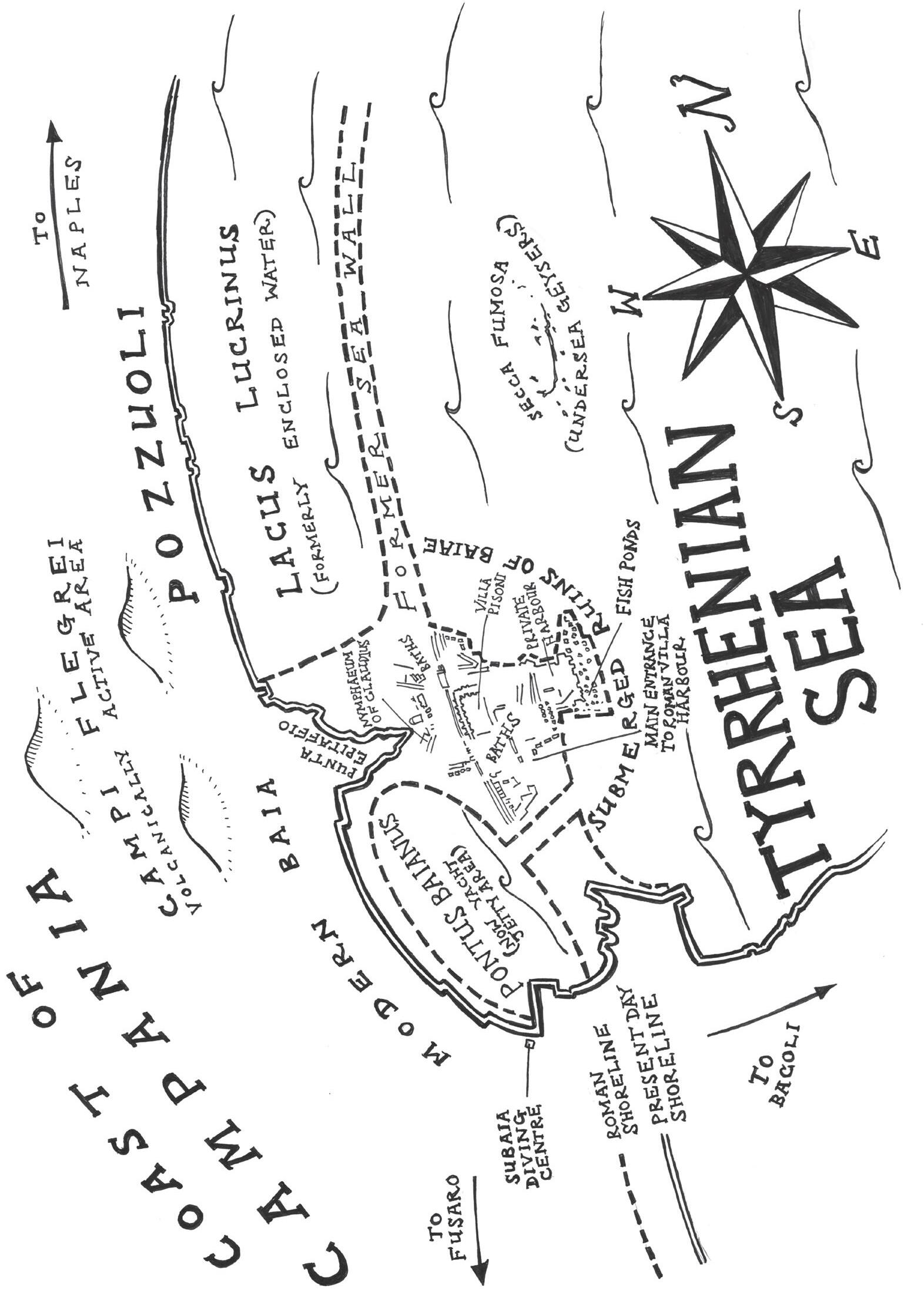
Sketch of Baia, Italy, from the author's journal
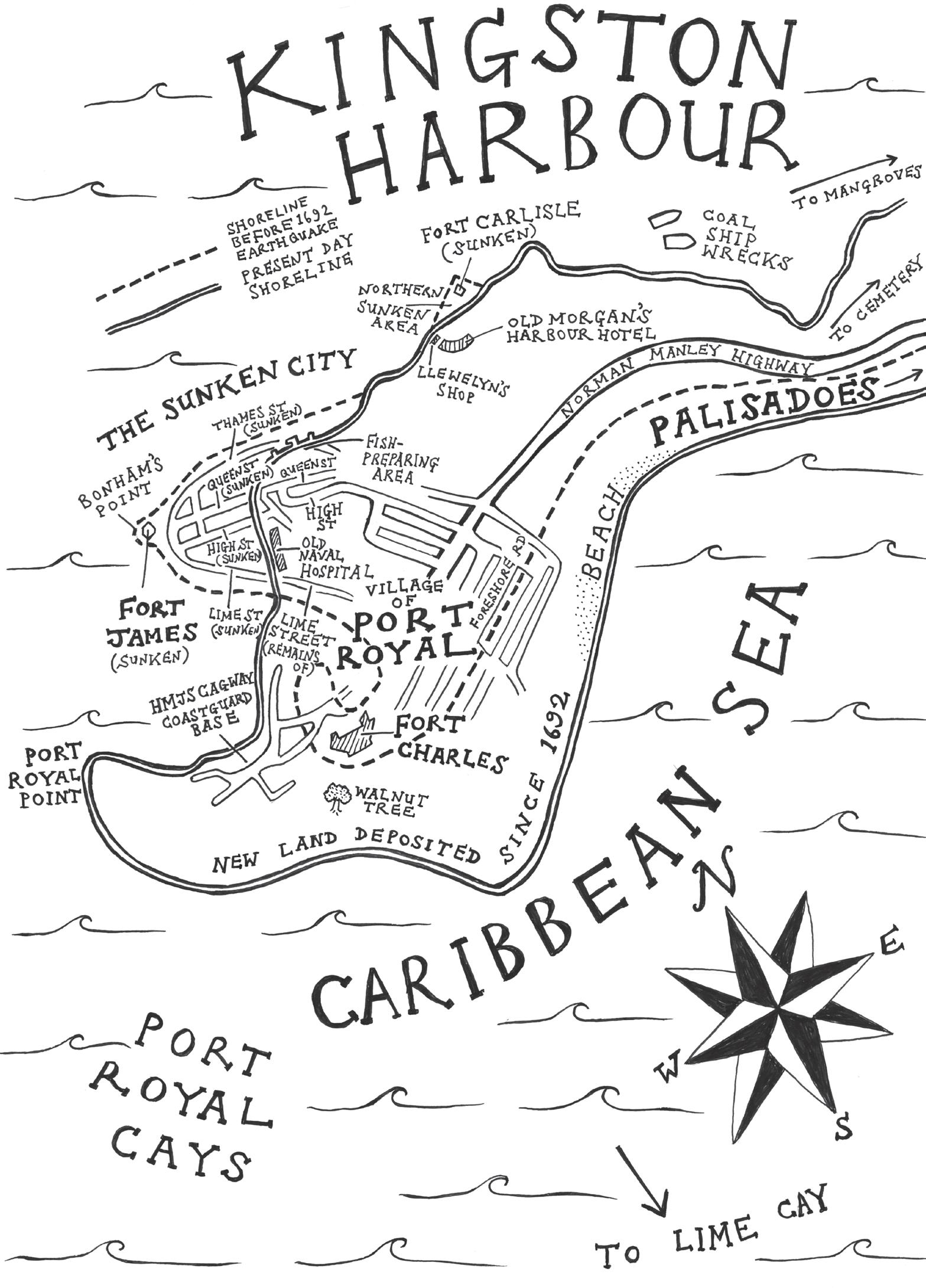
Sketch of Port Royal, Jamaica, from the author’s journal
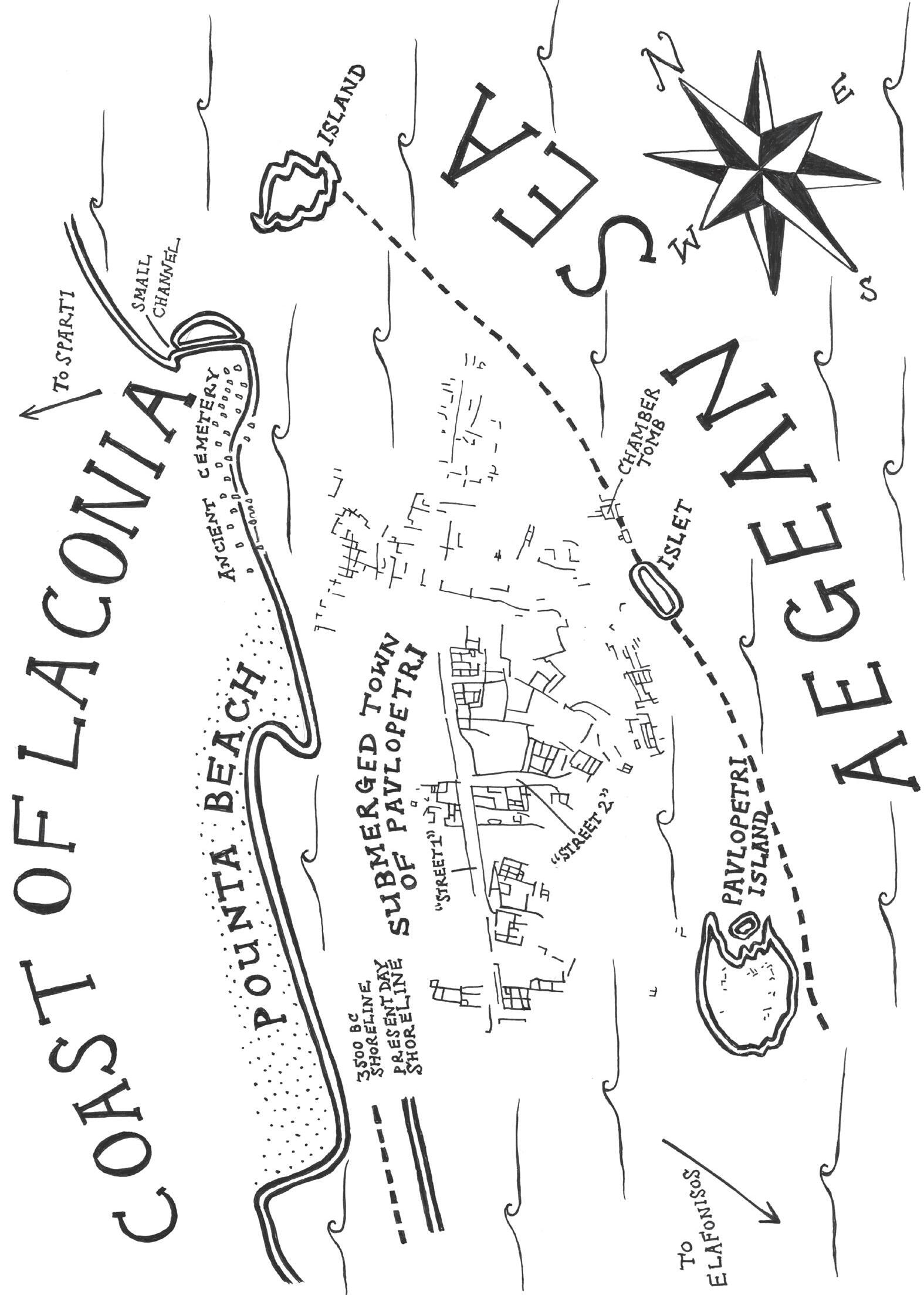
Sketch of Pavlopetri, Greece, from the author’s journal
c.3500 bc Pavlopetri occupied
c.2650 bc Helike occupied
c.1700 bc Oldest known copies made of the Atrahasis epic, a tale of a great flood
c.1600 bc Volcanic explosion kills all life on the island of Thera (Santorini), Greece
The island’s largest settlement, Akrotiri, is buried in volcanic ash
c.1000 bc Pavlopetri submerged
480 bc Persian army under Xerxes I invades Greece
431 bc Peloponnesian War between Athens and Sparta begins
426 bc Athenian fort on island of Atalanta destroyed
373 bc Helike destroyed by earthquake and submerged
c.360 bc Plato writes Timaeus and Critias, Greece Debate begins as to whether Atlantis may have been a real empire
c.800 Lower (eastern) part of Baia submerged, Italy
1552 Francisco López de Gómara declares the New World to be Atlantis
c.1600 Old chapel of Kingston lost to encroaching sea, England
1679–1702 Olof Rudbeck, in his Atlantica, attempts to prove that Sweden is Atlantis
1692 Port Royal submerged, Jamaica (7 June)
1793 William Blake publishes America a Prophecy
1878 Henry Fleuss invents rebreather system
1912 Alfred Wegener first proposes theory of continental drift
1916 SS Fortuna sinks, English Channel (22 October)
1931
Woods Hole Oceanographic Institution announces plan to find Atlantis
1943 Jacques Cousteau and Émile Gagnan invent automatic compressed-air diving lung that will come to be known as self-contained underwater breathing apparatus, or SCUBA
1953 The Silent World by Jacques Cousteau published
1959 Lion City flooded, China
1960s
Spyridon Marinatos and his team discover city of Akrotiri
Robert Marx excavates ruins of Port Royal
1960s–1970s ‘Doc’ Edgerton and others carry out sonar surveys in search of Helike
1974 Marinatos dies at Akrotiri
1977 Cayman Trader sinks, Port Royal Cays, Jamaica (13 August)
1986 Yonaguni Monument discovered, Japan
1990–91 Largest known microbialites discovered in Lake Van, Turkey
1992
Pierre Vidal-Naquet publishes ‘Atlantis and the Nations’
2000 Lost City hydrothermal vent field discovered atop Atlantis Massif
2002
2005
Dora Katsonopoulou and her team discover Helike, Greece
Graham Hancock links the Atlantis story to glacial melting events
Robert Sarmast seeks Atlantis off the coast of Cyprus
2019 Hasankeyf flooded, Turkey
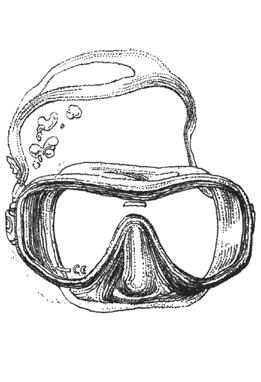
Since my father’s death, images of diving – and of committing things to the deep – had begun to stalk me. The paramedics who’d tried to resuscitate Dad had inserted a breathing tube into his mouth while they performed emergency decompressions on his chest. It was as if he’d drowned in his own bed. By the time I rushed into the room and found Mum kneeling distraught beside his body, the medics had already left, but the tube was still fixed in Dad’s mouth, kept in place by unsightly rubber bands stretched round his head. It looked like a makeshift snorkel. In that first cold shock of grief, I had a vague thought that Dad was still trying to breathe through this straw like the divers of old, who drew air down into the water through hollow reeds. But there was no water. He was trapped beneath the surface of a different substance, submerged in airless death. There was also a dark hopefulness about the scene. I wondered why they would have left the tube in his mouth unless there was still a chance he might start to breathe again.
We buried him in his best clothes and his favourite piece of jewellery – a gold knot ring in the style once favoured by sailors for their weddings, a braid that would never come loose. When we lowered the black and gold casket into the earth, it felt like we were committing it to the protection of a deep place. I had always seen the
interment of the dead as a final act, but now it felt like a gesture that demanded a response. I thought of people digging for chests full of riches or seeking them at the bottom of the sea. What was the sequel to this burial of treasure? Putting a breathing tube in my mouth and immersing myself in water felt like the closest I could get to Dad without following him to the grave. He would not have wanted me to. Remember to respect the sea, son, he always said. Cos it ain’t going to respect you. But it was because of him that I needed to do it.
In centuries past there was a goddess of the sea, worshipped by people of the north. She was, in a sense, the sea itself: a personification of the deep, and a symbol of our need to revere it. She was thought to weave entanglements of enchanted nets and lines, ensnaring seafarers who had dared to sail or dive into the waves. Her name meant ‘plunder’, ‘theft’, ‘seizure’. Perhaps in this name there was also a sense of revenge: of the sea striking back at mortals who invaded and despoiled her, whose weapons and ships polluted her world. I was born beside the sea, and the ocean terrified and seduced me. I heard its voice in my thoughts. It called. It warned. It spoke to me in cyclic dreams of a world overrun by water, and in nightmares where I would find myself caught among the weeds and discarded ropes slung on the seabed. I gave the ocean’s voice the name of the goddess. I called it Rán.
Submerged off the coast by my home town was an ancient chapel. On sunny weekends people walked the nearby beaches with their dogs, drank coffee and talked. I stared out to where the nubs of the ruins might be, masked by the grey-green water. Fishermen would sometimes swear they had heard the chapel’s bells tolling, dull calls mooning up from the deep. No doubt it was the sound of inland belfries they could hear, but I imagined myself on one of those boats, bucking sharply at night, in the wild rain perhaps, without a stable horizon. What must it be like aboard a tiny craft with its fragile ribs, knowing that down on the seabed, the scoured terrain of the spider crabs and eels, a temple – if there was anything left of it – stood, underneath the dark slop of the waves? Would even the bells that called from the land not be terrifying, draped with a mariner’s knowledge that one day they, like everything else, must be torn back
into the ocean? That every coastal dwelling will one day suffer the fate of Atlantis?
What was Atlantis? It was the world I dreamt of under the sea, strange even to Rán, because it was one that human hands had left behind. It was a place of ruins: columns, arches, towers, walls caressed by soft blue light, invaded by fishes, wide-eyed at the broken palaces where waterweeds grow, where crabs instead of spiders wait in the crevices and a shark swoops through a door where people once walked. The drowning of a civilisation cannot help but set the stage for another life. Perhaps you have dreamt of going there, where our kind no longer belongs. It would be not only a trespass, but a return.
That was my dream: to go to the drowned places. It was the counterweight to my fear of Rán, imagining that the beauty might be worth it, teaching me things that I could not learn on the land. It meant escape and freedom, discovering inner strength and a new understanding of our world; which is, in truth, a sea-world, where the land is a blip in the blue. I followed the call of the bells to that place, and to the many meaning of Atlantis, as I hope you might. It led to the strangest of healings.
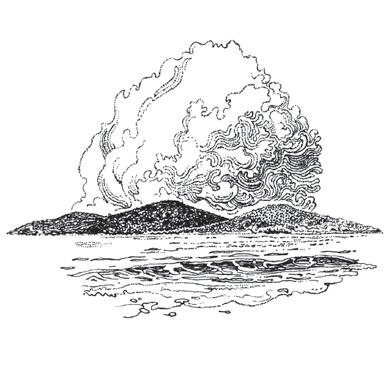
Long before our time, before even the time of the people who spoke of Rán, there was a legendary place beyond the sea. This was some 11,500 years ago, in an age before even the oldest of the great empires of antiquity were born: when Babylon, Egypt and Rome were not yet whispers on the lips of gods. A vast island – a continent, perhaps, by our reckoning – the size of western Asia and North Africa combined, lay in the Atlantic Ocean, beyond the Pillars of Hercules1 that separated it from the Mediterranean Sea. From north to south it stretched from the latitude of Cadiz far down the west side of the African continent. Springs and fountains danced across its wide and fertile plains, rich harvests grew without effort, and a young woman who had been orphaned on the cusp of her adulthood lived on a hill at the island’s centre. Her name was Cleito. The sea-god Poseidon had fallen in love with Cleito, and to keep anyone else from touching her, he raised concentric rings of hills and moats around her home. Before the invention of ships, no mortal men could pass Poseidon’s defences, so he alone fathered Cleito’s children. The eldest was named Atlas: not Atlas the Titan, whose shoulders supported the heavens, but Atlas the demigod, first king of the island which from then on bore his name: Atlantis nesos, the Isle of Atlantis.
Atlantis was blessed with many qualities which enabled its people to swiftly rise to power. Its rich lands meant they never hungered; its great size meant they never wanted for room; Poseidon’s moats made it formidable in the face of attack. With natural resources of stone and precious metals, the Atlanteans built a temple, a canal and a harbour; and with a great navy they subjugated all whom they met along the coasts of the Middle Sea. This Atlantean domination was the first seaborne empire the world had ever seen.
But far to the east of Atlantis, on a peninsula that lay just outside its sphere of conquest, another power was rising. Just behind a notch of coast in the land we now call Greece, a frugal tribe of farmers and soldiers had founded a little city-state called Athens: an inland realm, without ships or men of the sea. This was a ‘primeval Athens’, the ancestor city of the Athens of the golden age that would arrive millennia later with its philosophers, playwrights, statesmen, sculptors and poets. This primeval Athens was a simpler place. It did not reach overseas to spoil and predate on the lives of others. Clear of the nautical reach of Atlantis, with enough food to feed itself, and enough soldiers for its defence, the city lived by its own laws. It had no colonial ambitions. It had no hubris. It was strong, austere and fair.
It seemed fated that Atlantis and Athens would eventually collide, and they did. The war climaxed in a terrible battle with enormous casualties. Athens prevailed; but, in the aftermath, there was a great earthquake. The land was riven in pieces, and the armies of both sides were swallowed up into the earth. In a single night and day, the mighty island of Atlantis sank, together with all its civilians and survivors, its sciences and its armaments, its temples and its animals, into the sea.
All that was left was a treacherous area of mud and ooze lying just beneath the surface of the water, notorious to sailors as a death-trap. Atlantis would be memorialised in the form of the ocean that, to this day, bears its name: the Atlantic, stretching from the Pillars of Hercules to the New World.
As for its history, it fell entirely out of memory, as did the exploits of its valiant foe, primeval Athens. Except, that is, in one place – the city of Sais in the Nile Delta of Egypt, among the wise class of priests
whose depth of lore became the envy of the younger Greek world. In Egypt the story of Atlantis was handed down for some ninety centuries, until it was finally conveyed from one of these priests, via several Greek go-betweens, to Plato, one of the greatest philosophers of classical Greece.
Atlantis is no more. It lives on only as a story, a cautionary tale of empire and what happens when power is overreached by pride. There are some who believe it was the seed of later civilisations, that the far-flung peoples of the world must surely share some old and common root in the great lost island. The sea has taken Atlantis, but Atlantis is the name that will not drown.
This, at least, is what some would like to believe.

Time spreads like dye in cold water. Sorrows drown fast. Each drawing apart of the hands was like opening thick green curtains into a different way of being: prying open another realm that constantly recedes from reach.
Shadwell Basin is an old dock on the north bank of the River Thames, nowadays closed off to larger boats and surrounded by red and grey blocks of flats with steeply angled roofs. Its waters are thick with algae. On its bottom lurk shopping trolleys and motorcycles, now the furniture of fish: moustachioed Eurasian carp and scoop-mouthed pike. Online, men share pictures of the animals they have pulled out of the Basin. The same individual fish, recognisable by their missing scales and their peculiar tints of brass and gold, are, like petty criminals, repeatedly hooked and tackled and photographed, then thrown back into their shady underworld.
Swimming in the Basin is against the local laws, and there are signs that warn of its forty-foot depth, of the unknown hazards on the bottom, and the risk of catching Weil’s disease from the urine of local rats. Weil’s can cause haemorrhaging in the lungs, and if you catch it the chance of death is maybe 5 to 10 per cent. But the major cause of human demise in the Basin has been, predictably, drowning. Since
2010 there have been at least three fatalities, adding a haunted layer to the green water’s ghoulish look. In spite of all this, the Basin calls to the swimmer. Its quivering surface holds a promise of cool and current-free water, the perfect place to revive a skin that has been kept too long in the dark, and spark a bit of rhythm into winteraddled muscles.
It was a sharp, clear morning. I mooched along the gangway of planks to the path that ran around the dock’s edge and got changed into my trunks. Too scared to dive in head-first, I clambered down the slimy ladder and let out a silent gasp as the wintry water closed up to my neck, then swam breaststroke for a couple of minutes. Into these minutes was crammed more vital sensation than a body might feel in a fortnight spent indoors. And as time slows down at the thrill of this dazzling psychic and bodily stimulation, it is hard to assess how long you have been swimming for. In cold water the seconds disperse like ink, and the grime of quotidian worries dissolves away. Something in you is desperate to climb out and escape the cold, but each new stroke through the water brings you closer to the promise of a mysterious reward. Delving into another realm that constantly recedes from reach but which – with each attempt to touch it – stills another unwelcome thought, dissolves a little more of the anxiety that encrusts the modern mind. It is almost absurd that an experience so transformative does not bring about more visible change in the human body. When I got out I was shocked to find that I hadn’t turned green, but only a little flushed, the red of a mullet. After towelling off, I dressed and hurried back along the boardwalk. I had an appointment to meet my old friend Jamie Berger.
I used to live with Jamie in a London house full of gibbeted mice, Victorian flagstones and the smell of three-day parties. He had taught Sino-Japanese history at Harvard University, launched a restaurant known for smoked meats and terse bourbon cocktails, and had a sword, a petrified megalodon tooth, and an ancestor whose portrait was on the Confederate hundred-dollar bill. Our house lay a mile to the south of the Thames. It sat in a near-perpetual gripe of cold: sometimes the water in the toilet bowls froze solid. In those days Jamie’s breakfast was always a foam-topped quadruple espresso and a pair of hand-rolled
cigarettes, and my breakfast was the same as Jamie’s. Ten years had passed. We’d both stopped smoking now and shared a bond forged partly from the bitterness of the grudgingly reformed.
We met at the Grapes pub on Limehouse Reach, a beerhouse since the reign of Queen Elizabeth I. The bar was dark. Entering felt like an intrusion, and the yellow gloom made innocent middle-aged Londoners look like smugglers doomed to hang. The staircase to the bathroom was almost as steep as a crow’s-nest ladder, and everywhere there was the perfume of brackish moisture: of water that smelt undrinkable but which contained the promise of motion, adventure, danger, ships and risk. From the back of the pub jutted a balcony overlooking the spill of the Thames, and on the riverbank below a slender gallows could be seen: its root was black with bladderwrack weed, clutched by the river’s dark life. In Our Mutual Friend, Charles Dickens described ‘a tavern of dropsical appearance . . . the whole house impended over the water but seemed to have got into the condition of a faint-hearted diver, who has paused so long on the brink that he will never go in at all.’ He is thought to have had the Grapes in mind as he wrote.
Jamie’s father and mine had died not long apart. There was something of sons adrift about our meeting. Jamie ordered two pints of amber ale and we said ‘cheers’. Through the balcony doors of the pub the sounds of the Thames, its slaps and plips against the river wall and, behind and beyond them, its mighty hush, washed in.
‘What did your father die of?’ asked Jamie.
‘A stroke,’ I said. ‘Or as it says on the post-mortem paper, a spontaneous subarachnoid haemorrhage.’
Our glum looks were lightened slightly by the absurd-sounding medical language. To a doctor these words explain what happened. To most people, they conceal it. That can be useful when breaking bad news: when something has happened that isn’t nice to describe in simpler words. A blood vessel in Dad’s brain had burst and caused a lethal flooding of the pia mater, the ‘tender mother’, a delicate layer of brain tissue that cannot survive immersion. Thinking about this next to the sound of the water, it occurred to me that it had been a kind of drowning after all.
I knew Jamie was a diver. I told him that since Dad died I had become fixated with the idea of diving, and taken to poring over pictures of underwater ruins.
Jamie was quiet for a moment. ‘Have you ever dived?’ he asked.
‘No. Is it difficult?’
‘Can be.’
‘But you enjoyed it?’
‘Oh, enormously!’
‘What in particular?’
Jamie paused and smiled as memories and feelings came back to him. ‘There’s such a tremendous sense of transgression. Of truly having entered another world. The weightlessness people talk about, that definitely happens, and it’s remarkable. Though it’s not quite weightlessness exactly, but something else . . . more like being fully supported by the water. But the magical thing is the sense that you have somehow gone somewhere you were not . . . not designed to be. A feeling of having cheated nature. And the animals know you’re this strange thing and they investigate and they wonder what you are. There is really nothing like it.’
I sat back on my stool, astonished.
‘And fingers crossed, nothing goes wrong!’ he said.
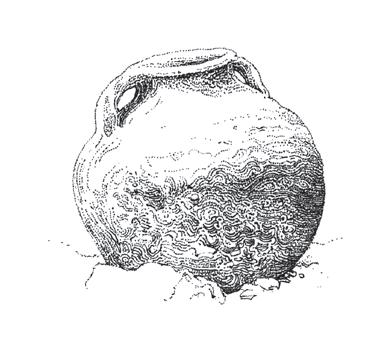
In the pools, green seaweed lay clotted and draped over chunks of rock in a way reminiscent of old ruins, where mosses and lichens encamp on tumbled blocks of stone.
Since I first learnt to walk I’d been observing the tides of the southern English coast, puzzled at this change that came over the shore and which seemed to have no equivalent on land: a contrast like night and day, but made by liquid instead of light. I waited for low tide and watched reruns of Stingray, an old children’s programme in which puppet aquanauts voyage through technicolour seas in a blue-finned whale-esque submarine, encountering silver-skinned fish-people who lived on the ocean bed. Once the sea had retreated – it went out incredibly far at spring tides, for reasons that were a mystery to me – I would spend hours searching about in rock pools, mustering the strength to lift heavy, barnacled stones and, when I felt brave, squeamishly brushing aside the gutweed, thongweed, bladderwrack and short kelp, slimy life forms with unglamorous names. Too young and impatient to notice the shy, armoured motion of limpets and winkles, too finicky to fall for the heart-shaped air chambers of the olive-drab spiral wrack, at first I was looking for anything that had
obvious senses, and that moved at a speed comparable to my own: shiny green shore crabs; spiny orange spider crabs; brown squat lobsters; shocked-looking, mudskipper-like blenny fish; and see-through prawns – organs on show through glass flesh – that darted backwards from my touch as if terrified.
There was something that kept bringing me back to the rock pools. They didn’t fully belong to the sea or to the land, but there was more to it than that. They never quite seemed to look ‘natural’. They looked like the site of a forgotten defeat, of reinhabited devastation: a smashed place, the wreckage of something that had once been taller and grander, and which now housed an entirely new kind of life and purpose. Marine algae curdled in pools, and flat fronds of seaweed lay slung over boulders like vines on abandoned temples. Was this nothing more than a ruin of geological chaos? Sometimes I thought I saw lines of stones, and wondered if they might be the remains of buildings. Surely not: but occasionally the wooden rows that had once been groynes could be seen, worn down to stumps like sperm whales’ teeth, poking up out of the sand as though from a shallow grave.
As I got older these boyish daydreams found solidity in a single word: Atlantis. Atlantis meant underwater ruins, temples with white stone columns. It meant a bearded sea-king, a merman perhaps, with a trident in his hand, ancient powers and treasure. But not everything the word conjured was hoary with age. Atlantis could also be hightech, futuristic: submarines and divers exploring the secrets of the deep. A sci-fi civilisation under the waves. I had no idea why this word evoked such a bizarre range of images, some of which were at odds with each other. The point of connection seemed to be the ocean. Without the sea, the columns were just the remnants of classical Greece or Rome. Without the sea, the man with a trident was just a statue; the marvellous city might have been Fritz Lang’s Metropolis. It was the sea that held it all together: it was the world in which these ideas had to exist in order to qualify as Atlantean.
This Atlantis had no creator. It never occurred to me that someone might have consciously invented the word, and the thought that an ancient philosopher could have coined it as part of a literary allegory was beyond me. I saw Atlantis everywhere. It was in cartoons and